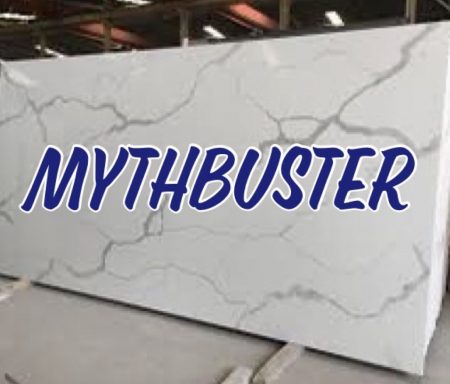
Quartz is a highly sought after countertop material. It offers both beauty and durability, with a wide range of colors and patterns to choose from. We do not want people counting quartz out based on nonfactual reasons, so we are busting 10 myths about this material!
1. Quartz and quartzite are the same material
A common misconception about quartz comes from its name, as “quartz” sounds very similar to “quartzite.” The key difference between the two is that quartz is man-made, while quartzite is a natural stone. However, as their names suggest, there are commonalities between the two materials. A quartz countertop is engineered with the same mineral, quartz (hence the names), as a quartzite countertop is. With quartz countertops, the man-made process binds the quartz crystals with resins, pigments, and other materials, such as bits of glass. Quartzite, in contrast, depends entirely on Mother Nature for its engineering.
2. Quartz and Corian® are the same material
Both of these materials are man-made; however, they are very different. In the 1960’s, an Italian company called BRETONSTONE® patented the engineered stone process, now known as quartz. A few years later, DuPont™ (one of our current brands) created Corian®, a solid surface construction material. Since both products came on the market in the same time frame, they were largely competitors. DuPont™ later acquired Zodiaq®, a renowned quartz brand that is now known as Corian® Quartz. This brand name often causes confusion, but Corian® Quartz is, in fact, a brand of quartz.
3. Quartz is made of completely synthetic materials
The typical ratio of natural and synthetic materials used to fabricate quartz slabs is about 90/10. The amount of silicon dioxide coming from natural quartz can be as high as 93 percent, with the remaining materials being advanced resins and pigments. Lower quality slabs made from prefabricated kitchen and bathroom countertops may contain as low as 88 percent quartz content. Any ratio below 88 percent quartz cannot provide the cohesiveness necessary to make slabs that resemble natural stone. That being said, quartz actually cannot be made of completely synthetic material.
4. Quartz needs to be sealed
Quartz countertops are extremely durable and require minimal maintenance. Caring for quartz is similar to caring for granite. A large difference between the two is that quartz is non-porous; therefore, it does not need to be sealed like granite does.
5. Quartz lacks variety
Nature produces variety in all materials, so no two slabs of natural stone are alike. However, just because quartz is a uniform material that is manufactured in a factory does not mean that it lacks variety. Quartz color and design is limited only by your imagination. We offer quartz in a range of colors and designs that convincingly mimic granite, marble, limestone, and concrete. Although veined and speckled designs are popular, quartz countertops come in solid designs as well.
6. Quartz burns easily
Quartz countertops are very tough and resistant to heat, making them quite difficult to burn. That being said, any countertop surface can crack or discolor if it has direct contact with heat. This is why we stress the importance of trivets and hot pads for all countertops. Regardless of your material, placing a hot pot or pan directly on the surface is not a safe decision.
7. Quartz is indestructible
Quartz is extremely durable. In fact, it is hard to find a countertop material tougher than quartz. Although this surface is a star when it comes to strength, no countertop is bulletproof. It can still break, crack, and scratch under the right conditions. As it is low-maintenance, preventative measures are minimal. Simply being mindful of what you expose your surfaces to (heat, chemicals, excess weight, etc.) should allow your quartz countertop to last you for years to come.
8. Quartz is as suitable for outdoor use as granite is
Quartz is well suited for a variety of interior applications, even in rooms where there is a lot of sunlight. We do not, however, recommend quartz for exterior use. If installed outdoors, it can discolor by prolonged exposure to direct sunlight and the heat that it emits. This is especially applicable to darker colors. We instead suggest granite for exterior applications. Granite does not discolor in result to prolonged UV exposure. This, however, will change in the near future, One of our brands, Ceasarstone®, is launching a new quartz product that is designed for exterior use. This product will allow homeowners to safely install quartz outdoors without having to worry about discoloration.
9. Quartz is more expensive than marble
Quartz is more durable than marble, so it only makes sense that it would be more expensive. Despite this, it is actually cheaper than marble in many instances. Quartz widely ranges in price. Our Quartz Value Collection, for example, is very modestly priced. There are more exotic and costly colors of quartz as well, but there is no need to break the budget if you desire quartz countertops. One of the many great things about this material is that it is suitable for all price ranges.
10. Quartz is the most elite countertop surface
This is based purely on opinion. No surface can be deemed as the most elite. Quartz, although a fantastic countertop surface, is not superior to other materials. Some may love the uniqueness of natural stone, while others prefer the predictability of man-made material. It all comes down to personal taste.
If any of the above myths caused you to be suspicious of quartz, we hope that busting them helped your view of this material. Part of our job is to help you stay informed with accurate information regarding countertops!
